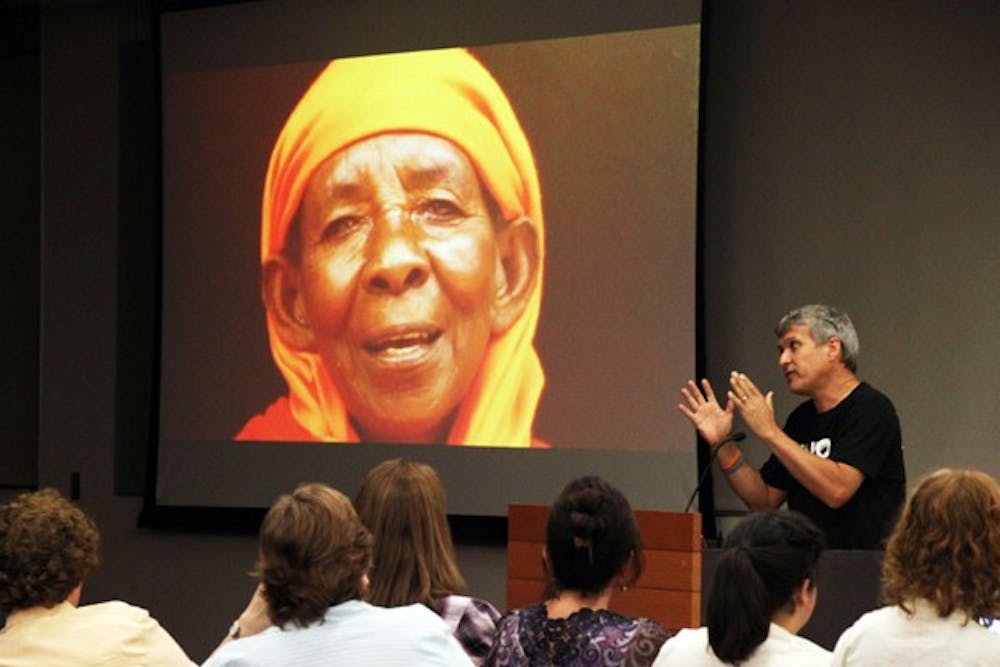For Carl Wilkens, genocide is a word that carries different types of significance.
It signifies both atrocity and massacre, but also tells a story of courage and forgiveness for a country emerging from the shadows of mass murder.
Wilkens, recognized as the only American to remain in Rwanda during a three-month genocide in 1994, visited ASU Wednesday night to discuss his book “I’m Not Leaving,” and to bring awareness to massacres going on in other parts of Africa today.
Wilkens was living in Kigali, Rwanda with his wife and three kids, working for the Seventh-day Adventist Church, when the genocide began on April 6, 1994.
The plane of the Hutu Rwandan president Juvénal Habyarimana had been shot down, instigating a systematic extermination attempt of Tutsi citizens by the Hutu militias.
As Americans were evacuated from the country, Wilkens’ family left to Nairobi while he stayed behind to protect two Tutsi workers that lived in his home.
“When we said goodbye, we didn’t know that it was going to last as long as it did or that it was going to be as horrific,” Wilkens said. “We knew it was terrible but we didn’t have any idea of the scale of the killing.”
He was confined to his home under a 24-hour curfew for the next three weeks, but then went to work aiding orphanages around the city.
“That pretty much defined my work for the remainder of the genocide — hunting and bargaining with killers and thieves to be able to find supplies for these orphanages and to negotiate all of the roadblocks they had around the city to deliver supplies to the orphanages,” Wilkens said.
The humanitarian recounted a day in late June, when he arrived at Gisimba Orphanage to deliver water to 400 orphans displaced by the killing and was soon surrounded by 50 militia members.
Wilkens said there was a three-hour standoff as the militia planned to murder the orphans until he convinced the Rwandan prime minister to help him spare the children.
Psychology and human studies senior Chelsea Pogue said stories like Wilkens’ are inspiring.
“It just kind of reminded me that there are a lot of people out there who do help and try to make a difference,” Pogue said. “For me, it was really rewarding.”
Pogue, President of ASU’s STAND, an anti-genocide club, said Wilkens’ story proves that everyone has the potential to impact the world.
“Even if you’re just one person (in) all this chaos you can make a difference and help people,” Pogue said.
Wilkens said three things kept him going: speaking with his wife daily via radio, practicing his faith and focusing on the needs of the orphans.
“With children dying at the orphanage from lack of water and medicine, to the killing that was happening around the city, the needs were right in your face,” Wilkens said. “I think the way we survived was focusing on those needs and how we could respond to them.”
Aerospace engineering senior Daniel Doetsch said he has been interested in the Rwandan genocide since he studied it in high school.
“It just always amazes me when I hear stories like this about how these conflicts are so shallow, and yet people do such dramatic things over shallow differences,” Doetsch said. “It’s just amazing to me that we all live on this one planet and we can’t get along.”
Wilkens said returning to Rwanda was difficult initially, but he now returns once or twice a year to the country, marked by a hope he never could have imagined amidst the genocide.
“The longer you are there, the more you are struck by the courage and the hope expressed by the people,” Wilkens said. “That becomes the dominant force on the horizon of your mind, the courage, determination and forgiveness that you witness among the people. You end up leaving Rwanda always with a sense of amazement and a sense of hope.”
Reach the reporter at brennan.j.smith@asu.edu
Click here to subscribe to the daily State Press newsletter.





